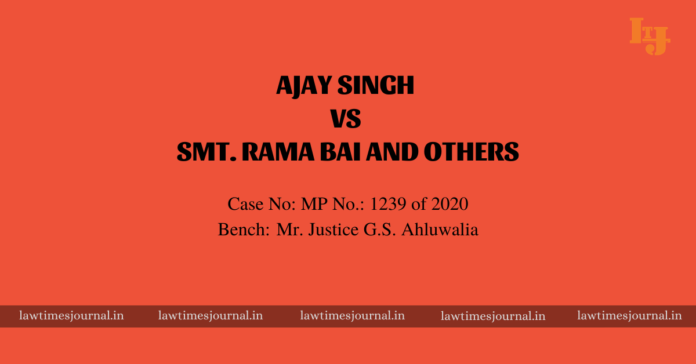
In the High Court of Madhya Pradesh
MP No.: 1239 of 2020
Civil Appeal Nos 9367-9369 of 2011
Petitioner
Ajay Singh
Respondent
Smt. Rama Bai and Ors.
Date of Judgement
2nd March 2020
Bench
Hon’ble Mr. Justice G.S. Ahluwalia
Introduction:
The Hon’ble High Court of Madhya Pradesh held that Courts cannot routinely order determination of paternity by way of DNA tests.
Facts of the Case:
- The Respondent no.1 and 2 by projecting themselves to be the wife and son of Raghuvar filed an application for mutation of their names. The petitioner filed his objection and stated that the respondent no.2 is not the son of Late Raghuvar and has no right to get his name mutated and the petitioner being the nephew of Raghuvar has looked after the deceased and out of love and affection Late Raghuvar has bequeathed his property in favor of the petitioner by executing a Will.
- The petitioner filed an application for determination of the paternity of respondent no.2 by conducting a DNA test. By order dated 29/8/2016 the Tahsildadr, Basoda, District Vidisha rejected the application on the ground that the similar application has already been rejected by order dated 15/6/2016. The petitioner preferred a revision before the Board of Revenue, which was transferred to the Court of Additional Collector, Vidisha in view of the amended provisions of MP Land Revenue Code and the Additional Collector by the impugned order dated 2/12/2019 has rejected the application.
- This petition under Article 227 of the Constitution of India has been filed against the order dated 2/12/2019 passed by Additional Collector, District Vidisha in case No.203/Revision/2019-20, by which the application filed by the petitioner for seeking DNA test of respondent no.2 to determine his paternity has been rejected.
Issue:
Whether in the mutation proceedings the respondent no.2 can be compelled to undergo the DNA test or his personal liberty is to be respected.
Judgment:
Mr. G.S. Ahluwalia Observed:
The Supreme Court in the case of Bhabani Prasad Jena Vs. Convenor Secretary, Orissa State Commission For Women and Another[1] has held as under:
“15. In Goutam Kundu v. State of W.B. this Court was concerned with a matter arising out of maintenance for child claimed by the wife. The husband disputed the paternity of the child and prayed for blood group test of the child to prove that he was not the father of the child. This Court referred to Section 4 and Section 112 of the Evidence Act and also the decisions of the English and American courts and some authoritative texts including the following statement made in Rayden’s Law and Practice in Divorce and Family Matters[2]: “Medical science is able to analyse the blood of individuals into definite groups; and by examining the blood of a given man and a child to determine whether the man could or could not be the father. Blood tests cannot show positively that any man is father, but they can show positively that a given man could or could not be the father. It is obviously the latter aspect that proves most valuable in determining paternity, that is, the exclusion aspect, for once it is determined that a man could not be the father, he is thereby automatically excluded from considerations of paternity. When a man is not the father of a child, it has been said that there is at least a 70 per cent chance that if blood tests are taken they will show positively he is not the father, and in some cases the chance is even higher; between two given men who have had sexual intercourse with the mother at the time of conception, both of whom undergo blood tests, it has likewise been said that there is a 80 per cent chance that the tests will show that one of them is not the father with the irresistible inference that the other is the father.”
Court also view the following judgments and dismissed the petition.
Accordingly, this Court is of the considered opinion that in a proceeding for mutation, the respondent no.2 cannot be directed to undergo the DNA test. Further, the petitioner is seeking mutation of his name on the basis of a Will and it is beyond the jurisdiction of the revenue authorities to determine the genuineness of a Will. If the petitioner is of the view that a Will was executed by Late Raghuvar in his favour, then he has to establish his title by filing a properly constituted civil suit.
Conclusion:
Hence, it is concluded that the Courts cannot routinely order determination of paternity by way of DNA tests.
Edited by Sree Ramya
Approved & Published – Sakshi Raje
Reference
[1] (2010) 8 SCC 633
[2] (1983), Vol. I, p. 1054
[3] SCC p. 428, para 26
[4] SCC p. 509, para 39
[5] SCC p. 524, para 81
[6] SCC p. 454-55, para 13






